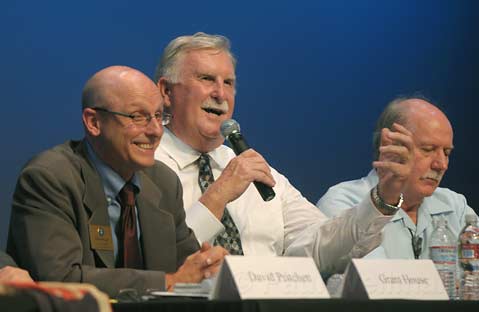Dancing with the Candidates
Singing, Dancing, Writing, Blowing Conch for Arts

It wasn’t American Idol or even Dancing with the Stars, but for 14 mayoral and City Council candidates, Monday night’s forum hosted by the Santa Barbara Arts Collaborative proved to be the next best thing.
Rather than delivering well rehearsed raps about height limits, growth, gangs, budget deficits, and bulb-outs, the 100 or so in attendance got to witness public office seekers sing, dance, and recite poetry in response to a questions posed by city poetry czar David Starkey about their personal involvement in the arts. Mayoral candidate and current City Councilmember Helene Schneider revealed she played piano and tap danced as a child. She also crafted a few lines of haiku poetry on the spot on the importance voting. Homeless advocate and mayoral candidate “Protest” Bob Hansen acquitted himself nicely with an a capella rendition of “Swing Low Sweet Chariott,” successfully enlisting the audience in an almost rousing sing-along. Commercial realtor John Thyne, running for city council, explained he’d performed in Oklahoma! and West Side Story and that his poetry had been published. Realtor and council candidate Frank Hotchkiss played a motorcycle cop in Cisco Pike, a movie starring Kris Kristofferson. He’s also written three novels. Bonnie Raisin, in her second bid for council, helped start Friends of the Lobero. Cathie McCammon, also in her second council effort, makes jewelry and plates out of fused glass. Council candidate Bendy White played Jesus as a little boy on the Lobero stage – “at which time,” he said, “I picked my nose.” Council candidate David Pritchett marched in the Solstice Parade as a kelp creature, and also delivered some on-the-spot verse in which he rhymed “budget” with “fudge it.” Grant House, the only incumbent councilmember in the race, explained that sewing machines from his sewing machine shop have been used to make costumes for the Soltice and Santa Maria theater troupe PCPA. He also inexplicably credited a 1985 production of A Chorus Line, produced by Rod Lathim of the Arts Collaborative, for sparking his political career. “It’s all your fault,” he shouted out to Lathim in the audience. Chamber of Commerce President Steve Cushman, running for mayor, recited a poem he wrote, “‘I’ is the Ninth Letter,” in which he outlined a menu of simple pleasures that still enchanted him. Dr. John Gibbs, running for council, explained he collaborated on a “widely unpublished” parody of Mother Goose rhymes entitled, “I Was Goosed.” Cruzito Cruz, running for council, blew trumpet-like into a ceremonial conch four times and then performed a short Aztec dance, explaining it was a form of prayer. Council candidate Lane Anderson explained that the hundreds of crosses he helps assemble at the base of Stearns wharf every month in honor of the servicemen and women killed in the Iraq and Afghanistan wars, qualifies as “an interactive art display.” Finally Dianne Channing, running for council, noted that she’d performed as a ballerina many years and that she and her husband had run a successful commercial photography studio for more than 20 years.
Missing in action was mayoral candidate and councilmember Dale Francisco, who plays cello and who explained he was too busy to attend the Monday night forum. Mayoral candidate Isaac Garrett provided the same explanation for his absence. Also missing were council candidates Michael Self and Justin Tevis.
Despite this overwhelming enthusiasm for the arts, few candidates were willing to make any bold commitments to help sustain arts funding. Most agreed that the arts were not just part of the city’s soul, but a key economic force and major draw for the tourist dollar. But in today’s tough economic climate, they all lamented, dollars are scarce. “When we’re in trouble, the last thing in the world I’d want to cut is funding for the arts,” said House. Cushman described individual artists as “brave souls,” saying artists had the same needs as entrepreneurs everywhere. He suggested that City Hall could place maps in city parking garages showing the location of all art galleries. (He also suggested that City Hall could lease out the garage to a private business, turn the library over to the art museum, and sell the downtown police station and relocate the department to City Hall.) Councilmember Schneider reminded the crowd that City Hall spends nearly $500,000 a year on arts events and festival, and pointed out how City Hall helped sponsor the program in which art is now posted prominently in the window displays of vacant State Street store fronts. She acknowledged that Ventura funds arts programs by taxing new developments, but cautioned that any new art tax would require a two-thirds majority vote of city residents.
Lurking just beneath the surface Monday night were unresolved tensions between smaller arts organizations and the Granada Theater, which gave rise to the formation of the Arts Collaborative in the first place. Organizers with smaller arts groups – known as the small “a” arts – got upset because the Granada Theater – known as “the big “A” art group – pre-empted the city’s normal arts funding application process to secure $500,000 from City Hall. To date, the Granada has received $5 million in city redevelopment dollars, and the Granada parking garage, which typically is half-empty, cost City Hall an additional $25 million. When poetry czar Strarkey asked candidates whether City Hall should take on more oversight over such a substantial investment of public funds, councilmember Grant House cautioned them against going there. “If we divide ourselves into capital “A” and little “a” arts, we’re not going to make it,” he said. (Gibbs noted that in contrast to the Granada’s $25 million price tag, Cottage Hospital just built a new designer garage for just $7 million.) Councilmember Schneider brought to light, however obliquely, one of the bones of contention between the two camps. She noted that the small “a” camp had proposed that all major venues voluntarily agree to impose a $1 per ticket surcharge, the proceeds of which would fund local arts groups. The Lobero Theater had agreed to this, she said, so had the County Bowl and the Marjorie Luke Theater. What she didn’t say was that the Granada Theater had opposed this tax and the proposal died. Little wonder that council candidate David Pritchett won loud applause by suggesting that the Granada drop its matinee prices “so Santa Barbara locals could afford to go.”



